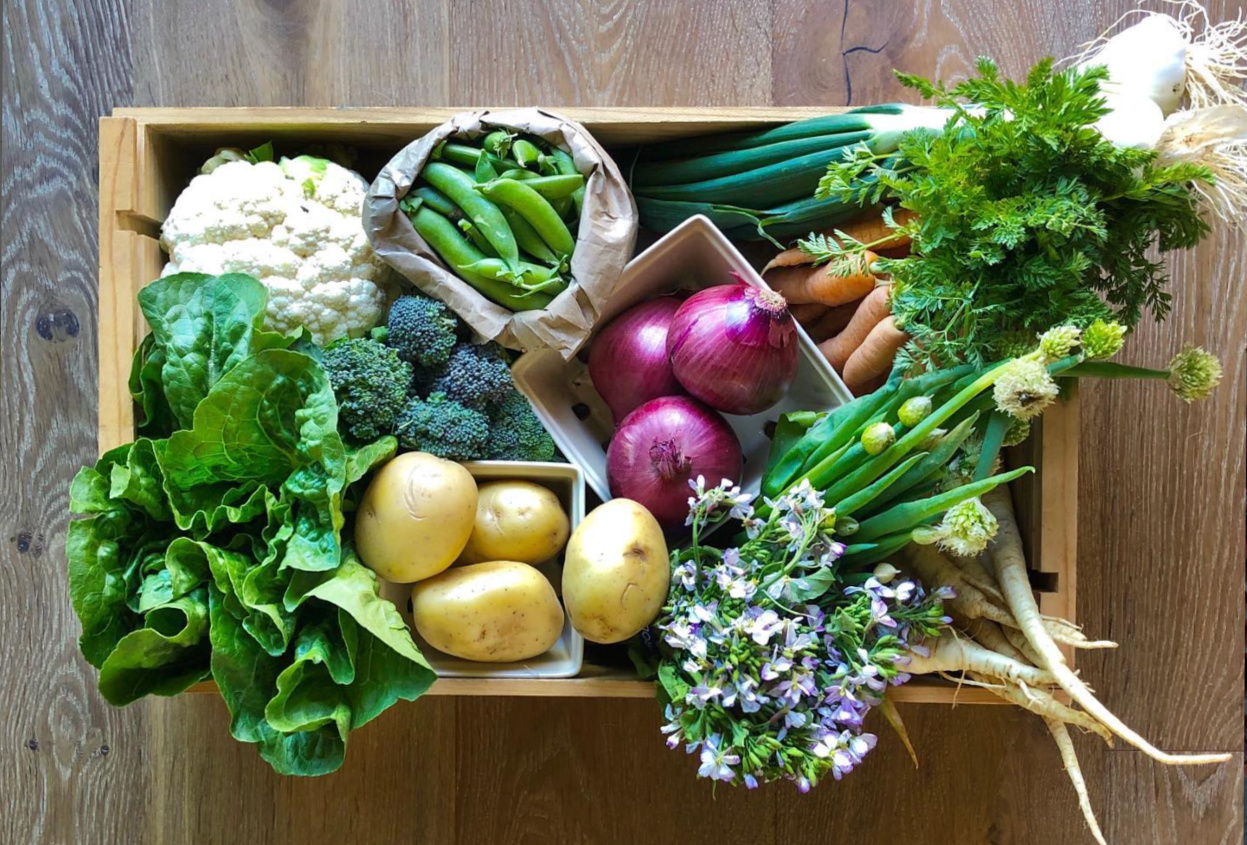For shoppers who patiently sit out winter’s fresh turnips and stinging nettles, here’s a head’s up: Spring produce has officially arrived at farmers’ markets throughout the Bay Area.
“Green garlic is the first sign,” says Carolyn Jensen, a trained chef and food influencer from Marin County who has faithfully shopped at the farmers’ market every week for the past 25 years. “To me, green garlic is the sign that spring is just around the corner.”
It’s also one of the five spring produce products that Jensen says are must-buys at Bay Area farmers’ markets in early spring.
1. Green Garlic
Arriving at farmers’ markets in late February and early March, green garlic is the plant thinned from the rows of regular garlic that are harvested later in the year. Mild in flavor and very tender, it’s only available for a few weeks.
“It just screams spring,” Jensen said.
How to Serve It: Jensen chops up the pale green and white parts and sautés them with leeks and spring onions. The result is a kind of “California spring mirepoix” that spends the next few weeks in all her dishes. “Use the combo in pasta, mix it with mayo as a sandwich spread, or add it to omelets, vinaigrettes, beans and salads.”
2. Asparagus
Asparagus hit the farmers’ markets in just the last two weeks—and the season is very short, lasting six weeks or so. Jensen recommends looking for asparagus grown in the Sacramento River Delta, which is especially tender and sweet.
How to Use It: “Asparagus and eggs are the perfect match,” said Jensen, who recommends grilling it off-heat or steaming it quickly to preserve a bit of crunch. Top it with a poached egg and bread crumbs or add it to a frittata. Jensen also adds asparagus to a new potato salad with black, dry-cured olives, pickled red onion, hard-boiled eggs and a tarragon vinaigrette.
3. Artichokes
There aren’t too many farmers’ markets on Earth where you can buy baby artichokes—so grab them if you see them. “We are lucky to live just outside the artichoke capitals of the world, in Castroville and Watsonville,” said Jensen, who recommends watching for a purple Italian varietal she has seen at markets lately.
How to Use It: “We do a lot of steamed artichokes, because that’s how I grew up eating them,” Jensen said, adding that the baby ones are great in pasta—especially when sautéed with the green garlic, leek and spring onion mix.
“Spring produce is tender and young, you don’t need to do a lot to it,” she said. “It is so flavorful you don’t want to cook it too much and take away from its delicate nature.”
4. Fresh Peas
Eat peas straight out of the shell or steam them and serve them with butter and pearl onions. “I don’t have anything against frozen peas—I use them, too,” Jensen said. “But I can’t imagine a better spring side dish than steamed fresh peas with herbs.”
How to Use It: “They’re not that common, a bit laborious and pretty expensive, but if you’ve never had a fresh pea, treat yourself to a bag this spring,” Jensen said. Look for English shelling peas in brown paper bags at local farmers’ markets.
5. Strawberries
“Though we’re very lucky to live in a state where you can technically find fresh strawberries at the farmers’ market all year long, the season really begins in March,” Jensen said. “They’re another sign of spring, and the start of what’s to come in the market.”
Winter storms were especially hard on berry crops, making them that much more special this year (and a bit more expensive, too).
How to Use Them: If you don’t eat the whole basket before you get home, make a quick jam with super fresh strawberries to eat on toast with peanut butter. “You just need to add a bit of sugar to the berries so they release their juices.” She also likes to bake a strawberry cake or scones for brunch.
A Guide to San Francisco Farmers’ Markets
San Francisco has at least one farmers’ market happening every day of the week except Monday. Check out the map below for where to find these spring “must-buys” and the rest of the Northern California bounty around town.
Bernal Heights | Saturday, 6 a.m.-2:30 p.m.
San Francisco State University Campus | Thursdays, 10 a.m.-3 p.m.
Castro | Wednesdays, 3-7 p.m., April 5 through Nov. 15
Inner Richmond | Sundays, 9 a.m.-2 p.m.
Lower Haight | Sundays, 9 a.m.-1 p.m.
Embarcadero | Saturdays, 8 a.m.-2 p.m., and Tuesdays and Thursdays, 10 a.m.-2 p.m.
Fillmore/Western Addition | Saturdays, 9 a.m.-1 p.m.
Fort Mason | Sundays, 9:30 a.m.-1:30 p.m.
Civic Center | Sundays, 7 a.m.-5 p.m., and Wednesdays, 7 a.m.-5:30 p.m.
Inner Sunset | Sundays, 9 a.m.-1 p.m.
Mission | Thursday, 3-7 p.m., March through November
Noe Valley | Saturdays, 8 a.m.-1 p.m.
North Beach | Saturdays, 9 a.m.-1 p.m.
Outer Sunset | Sundays, 9 a.m.-2 p.m.
Stonestown | Sundays, 9 a.m.-1 p.m.
Sea Cliff | Wednesdays, 10 a.m.-2 p.m.
